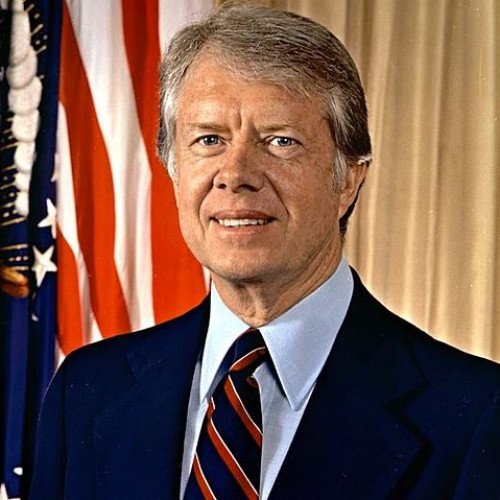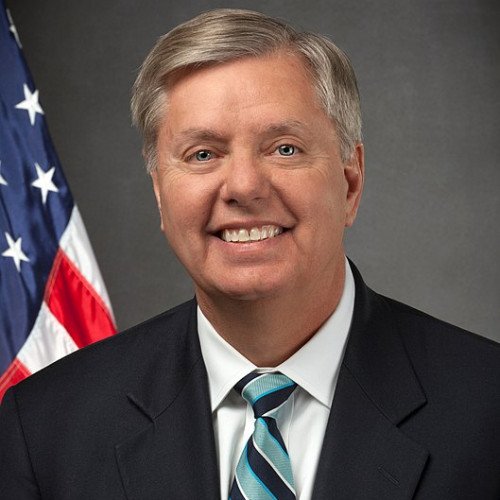Jimmy Carter VS Lindsey Graham

Jimmy Carter
James Earl Carter Jr. (born October 1, 1924) is an American politician and philanthropist who served as the 39th president of the United States from 1977 to 1981. A member of the Democratic Party, he previously served as a Georgia State Senator from 1963 to 1967 and as the 76th governor of Georgia from 1971 to 1975. Since leaving the presidency, Carter has remained engaged in political and social projects as a private citizen. In 2002, he was awarded the Nobel Peace Prize for his work in co-founding the Carter Center. Raised in Plains, Georgia, Carter graduated from the United States Naval Academy in 1946 with a Bachelor of Science degree and joined the United States Navy, where he served on submarines. After the death of his father in 1953, Carter left his naval career and returned home to Georgia to take up the reins of his family's peanut-growing business. Carter inherited comparatively little due to his father's forgiveness of debts and the division of the estate among the children. Nevertheless, his ambition to expand and grow the Carters' peanut business was fulfilled. During this period, Carter was motivated to oppose the political climate of racial segregation and support the growing civil rights movement. He became an activist within the Democratic Party. From 1963 to 1967, Carter served in the Georgia State Senate, and in 1970, he was elected as Governor of Georgia, defeating former Governor Carl Sanders in the Democratic primary on an anti-segregation platform advocating affirmative action for ethnic minorities. Carter remained as governor until 1975. Despite being a dark-horse candidate who was little known outside of Georgia at the start of the campaign, Carter won the 1976 Democratic presidential nomination. In the general election, Carter ran as an outsider and narrowly defeated incumbent Republican President Gerald Ford. On his second day in office, Carter pardoned all the Vietnam War draft evaders by issuing Proclamation 4483. During Carter's term as president, two new cabinet-level departments, the Department of Energy and the Department of Education, were established. He established a national energy policy that included conservation, price control, and new technology. In foreign affairs, Carter pursued the Camp David Accords, the Panama Canal Treaties, the second round of Strategic Arms Limitation Talks (SALT II), and the return of the Panama Canal Zone to Panama. On the economic front, he confronted stagflation, a persistent combination of high inflation, high unemployment and slow growth. The end of his presidential tenure was marked by the 1979–1981 Iran hostage crisis, the 1979 energy crisis, the Three Mile Island nuclear accident, and the Soviet invasion of Afghanistan. In response to the invasion, Carter escalated the Cold War when he ended détente, imposed a grain embargo against the Soviets, enunciated the Carter Doctrine, and led a 1980 Summer Olympics boycott in Moscow. In 1980, Carter faced a challenge from Senator Ted Kennedy in the primaries, but he won re-nomination at the 1980 Democratic National Convention. Carter lost the general election to Republican nominee Ronald Reagan in an electoral landslide. He is the only president in American history to serve a full term of office and never appoint a justice to the Supreme Court. Polls of historians and political scientists usually rank Carter as a below-average president. Carter's activities since leaving the presidency have been viewed more favorably than his presidency itself. In 1982, Carter established the Carter Center to promote and expand human rights. He has traveled extensively to conduct peace negotiations, monitor elections, and advance disease prevention and eradication in developing nations. Carter is considered a key figure in the Habitat for Humanity charity. He has written over 30 books, ranging from political memoirs to poetry, while continuing to actively comment on ongoing American and global affairs such as the Israeli-Palestinian conflict.
Statistics for this Xoptio

Lindsey Graham
Lindsey Olin Graham (born July 9, 1955) is an American politician serving as the senior United States Senator from South Carolina, a seat he has held since 2003. A member of the Republican Party, Graham served as chairman of the Senate Committee on the Judiciary from 2019 to 2021. A native of Central, South Carolina, Graham received his Juris Doctor degree from the University of South Carolina School of Law in 1981. Most of his active duty within his span of military service happened from 1982 to 1988 when he served with the Judge Advocate General's Corps in the United States Air Force, as a defense attorney and then with the Air Force's chief prosecutor in Europe based in West Germany. Later his entire service in the U.S. Air Force Reserve ran concurrently with his congressional career. He was awarded a Bronze Star Medal for meritorious service in 2014. Graham worked as a lawyer in private practice before serving one term in the South Carolina House of Representatives from 1993 to 1995. He served for four terms in the United States House of Representatives for South Carolina's 3rd congressional district from 1995 to 2003. In 2002, Graham won the U.S. Senate seat vacated by retiring Republican incumbent Strom Thurmond. He won re-election for a fourth term in 2020. Graham is known in the Senate for his advocacy of a strong national defense and aggressive interventionist foreign policy. Initially, he was also known for his willingness to be bipartisan and work with Democrats on issues like campaign finance reform, a ban on waterboarding, immigration reform, and judicial nominees. He has criticized the Tea Party movement, arguing for a more inclusive Republican Party.Graham sought the Republican nomination for president between June and December 2015, dropping out before the 2016 Republican primaries began. He was an outspoken critic of fellow Republican Donald Trump's 2016 candidacy and repeatedly declared he did not support Trump; in particular, he took issue with Trump's comments on Graham's close friend, Senator John McCain. After a March 2017 meeting with Trump, Graham became a staunch ally of the president, often issuing public statements in his defense. His reversal caught both parties by surprise and sparked much media attention. Graham became chairman of the Senate Judiciary Committee in 2019. Graham led the U.S. Supreme Court confirmation hearings for Amy Coney Barrett, who was successfully appointed Associate Justice in October 2020.